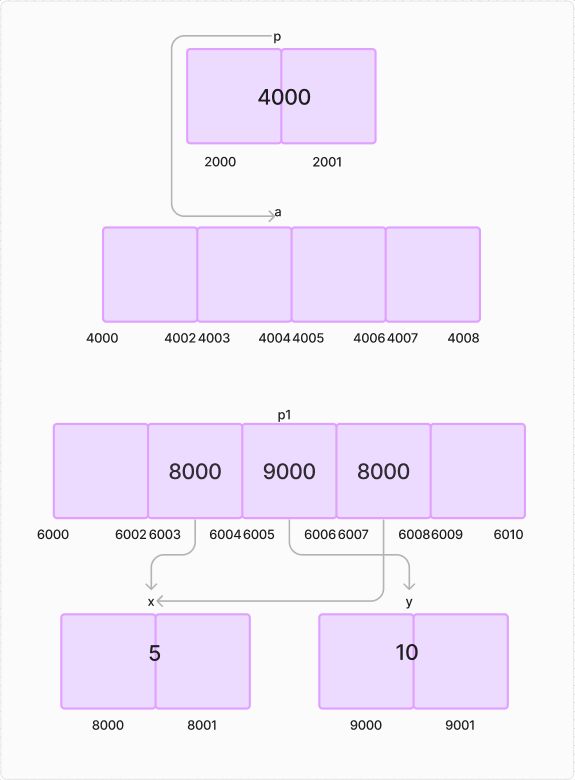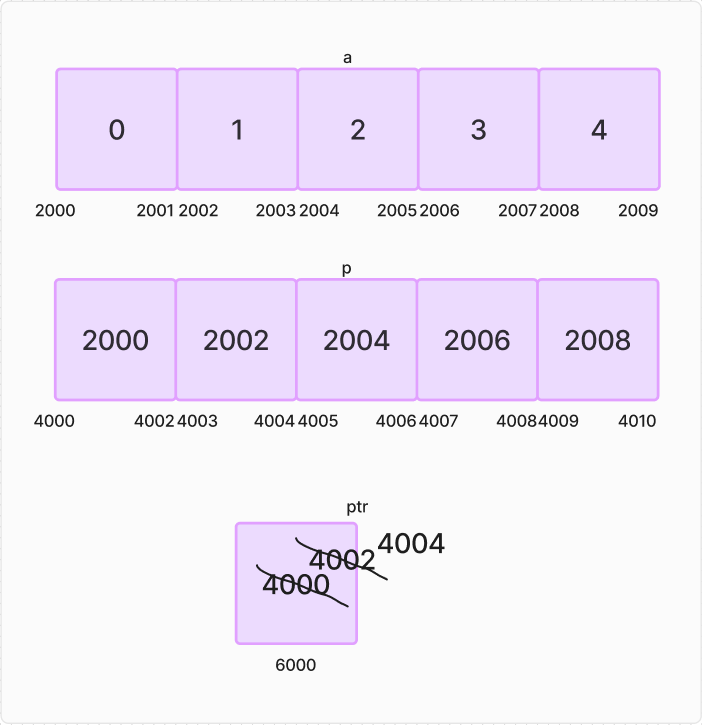Pointers and 1D Arrays
int a;
int x[5];
a = 5;
x = 5; // Error
// Name of array is a constant pointer to 1st element of array.
printf("%u",x);
printf("%d",*x);
printf("%d",*x+1);
printf("%d",*(x+1));
2000000
2000004
5
6
0
-
printf("%u\n", x);- This statement would print the memory address of the array x. The %u format specifier is used to print an unsigned integer, which is the format of memory addresses. -
printf("%d\n", x+1);- This statement would print the memory address of the second element of the array x. The x array is implicitly converted to a pointer to its first element, and adding 1 to that pointer advances it to the next element. -
printf("%d\n", *x);- This statement would print the value of the first element of the array x. The * operator is used to dereference the pointer to the first element, which retrieves the value stored at that memory location. -
printf("%d\n", *x+1);- This statement would print the value of the first element of the array x plus 1. The *x expression retrieves the value stored at the memory location pointed to by x, and the +1 expression increments that value by 1. -
printf("%d\n", *(x+1));- This statement would print the value of the second element of the array x. The x array is implicitly converted to a pointer to its first element, and adding 1 to that pointer advances it to the next element. The * operator is then used to dereference the pointer to the second element, which retrieves the value stored at that memory location.
Passing 1D Array to Function
#include <stdio.h>
void array(int *p){
*p = 10;
*(p+1) = 20;
p[2] = 3;
3[p] = 5;
}
int main() {
int x[4];
array(x);
return 0;
}
As in above example, Generally 1D array is passed as call by reference.
If we pass by value then we would not be able to change the value of array elements.
Practice Questions
#include <stdio.h>
int main() {
int x[5] = {1, 3, 6, 9, 4};
printf("%d\n", *x);
printf("%d\n", *(x + 1));
printf("%d\n", *x + 1);
printf("%d\n", *(x + 1)+2;
printf("%p\n", x);
printf("%p\n", &x);
printf("%p\n", x + 1);
printf("%p\n", &x + 1);
printf("%d\n", *x++);
printf("%d\n", (*x)++);
printf("%d\n", ++*x);
printf("%d\n", *++x);
return 0;
}
1
3
2
5
0x7ffee1234560
0x7ffee1234560
0x7ffee1234564
0x7ffee1234580
Error
1
3
Error
-
printf("%d\n", *x);- prints the value stored at the address pointed to by
x. Sincexis an array,*xrefers to the first element of the array, which is 1.
- prints the value stored at the address pointed to by
-
printf("%d\n", *(x + 1));- Prints the value stored at the address
x + 1, which is the second element of the array, which is 3. The expressionx + 1is a pointer arithmetic operation that moves the pointer to the next element of the array.
- Prints the value stored at the address
-
printf("%d\n", *x + 1);- prints the sum of the first element of the array (1) and 1, resulting in 2.
-
printf("%d\n", *(x + 1)+2);- Prints the value of the second element of the array x (which is 3) plus 2, resulting in 5.
-
printf("%p\n", x);- Prints the address of the first element of the array, which is
0x7ffee1234560(the actual address may vary).
- Prints the address of the first element of the array, which is
-
printf("%p\n", &x);- Prints the address of the entire array, which is also
0x7ffee1234560.
- Prints the address of the entire array, which is also
-
printf("%p\n", x + 1);- Prints the address of the second element of the array, which is
0x7ffee1234564.
- Prints the address of the second element of the array, which is
-
printf("%p\n", &x + 1);- Prints the address of the memory location immediately after the array, which is
0x7ffee1234580.
- Prints the address of the memory location immediately after the array, which is
-
printf("%d\n", *x++);-
Error. First it will try to solve
x++. Name of array is a constant pointer to the first element. Increment not possible.
-
-
printf("%d\n", (*x)++);- First dereferences the pointer x to access the second element of the array, and then increments the value of that element. Prints 1 and increments the value as 2.
-
printf("%d\n", ++*x);- First increments the value of the element (which is now 2), and then prints the new value 3.
-
printf("%d\n", *++x);- Not possible. Constant pointer.
#include <stdio.h>
void array(int *p){
// 6. p pointer created at address 4000 having value 2000
printf("%d", *p++); // 7. print 5 and increment p to 2002
print("%d", (*p)++); // 8. print 10 and increment value at 2002 to 11
printf("%d", *++p); // 9. increment p to 2004 and print value at 2004 -> 15
printf("%d", ++*p); // 10. increment value at 2004 to 16 and print 16
printf("%d", p[-1]) // 11. from 2004 points to 2002 and prints value at 2002 -> 11
}
int main() {
int x[3] = {5, 10, 15};
// 1. 3 elements in array let address be 2000, 2002, 2004
// of value 5, 10, 15 respectively.
printf("%d", *x); // 2. value at 2000 -> 5
printf("%d", *(x+1)); //3. value at 2002 -> 10
printf("%d", *x++); // 4. Error.
array(x); // 5. control transfer
return 0;
}
Pointer to an array and An Array of pointers
#include <stdio.h>
int main() {
int (*p)[5]; // Pointer to an array of 5 integers
int a[5];
int *p1[5]; // Array of 5 pointers to integers
int x = 5, y = 10;
p1[1] = &x;
p1[2] = &y;
*(p1 + 3) = &x;
p = &a;
sizeof(p);
sizeof(p1);
p + 1; // p + 10 => 10
p1 + 1; // p1 + 2 => 6002
p1 // 6000
*p1 // 9000
**p1 // 10
*(*p1+1) // p1 is 6000. value at 6000 is 9000. 9000 + 1 is 9002.
// value at 9002 is junk
return 0;

#include <stdio.h>
int main() {
int a[0] = {0, 1, 2, 3, 4}
int *p[] = {a, a+1, a+2, a+3, a+4};
int **ptr = p;
a, *a // 2000 0
p, *p, **p // 4000 2000 0
ptr, *ptr, **ptr // 4000 2000 0
// ptr will not print 6000 as ptr is not an array with base address. ptr is a pointer
ptr++; // 4000 and ptr is now pointing to 4002
ptr-p, *ptr-a, **ptr // 1 1 1
*ptr++; // 2002 and will increment 4002 to 4004
ptr-p, *ptr-a, **ptr // 2 2 2
*++ptr; // will increment 4004 to 4006 and print 4006
ptr-p, *ptr-a, **ptr //3 3 3
}
